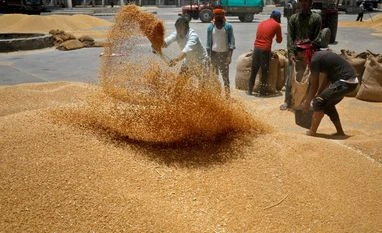Govt relief on PDS wheat quota, to launch Rs 1K cr credit guarantee fund
Secretary Sanjeev Chopra says food prices to remain stable during festivals; mulls lifting curbs on non-basmati rice exports
)
(Reuters)
Listen to This Article
The Centre has decided to partially restore wheat allocation for the beneficiaries of the government’s flagship free grains programme, Pradhan Mantri Gareeb Kalyan Ann Yojana (PMGKAY), over two years after it had slashed the wheat quota and supplemented it with rice due to reduced crop yield.
Under the PMGKAY — which is among the world’s biggest social welfare schemes — more than 800 million poor people get five kg free food grain every month.
The move, which will be implemented starting next month, is being seen as another bid to check prices ahead of crucial state elections.
Food Secretary Sanjeev Chopra, while highlighting achievements in 100 days of the Modi 3.0 government, said a committee of ministers has approved an additional 3.5 million tonnes of wheat under PMGKAY.
Meanwhile, in a separate development, Chopra said that the Centre has also decided to launch a Rs 1000 crore credit guarantee scheme for banks so that they are not constrained while giving loans against electronic Negotiable Warehouse Receipts (eNwR) and the quantum goes up from the existing around Rs 4000 crore.
Also Read
The target is to raise the volume of such pledged loans to over Rs 100,000 crore in the next 10 years. The food secretary also asserted that no unusual spike in prices of essential commodities is expected during the upcoming festival season.
On the increased wheat allocation, Chopra said that it will continue until March 2025, potentially making efforts to restore the wheat-rice ratio under the scheme.
Asked if this increased quantity restores the wheat-rice ratio, the Secretary said, “It will still be lower by 1-2 million tonnes from the normal quantity.” Chopra also said that the allocation could be reviewed based on future developments.
In May 2022, the government had reduced wheat allocation to 7.1 million tonnes from 18.2 million tonnes and increased the rice allocation under PMGKAY because of tight supplies due to lower domestic production.
Chopra highlighted the current “ample wheat” availability, citing last year’s bumper production of 112.9 million tonnes. “Even by conservative industry estimates, it was at least 4-5 million tonnes higher than the previous year,” he said.
The government’s procurement stands at 26.6 million tonnes, against the actual production of 112.9 million tonnes last year.
Chopra said there are no immediate plans to sell wheat under the Open Market Sale Scheme (OMSS), given the stability in wheat and wheat product prices.
However, he didn’t rule out future OMSS sales.
NCEL exports clock Rs 4K cr in revenues; Amit Shah to launch White Revolution 2.0
The National Cooperative Exports Limited (NCEL), established late last year under the guidance of the newly formed Ministry of Cooperatives, clocked a revenue of nearly Rs 4,000 crore through exports so far, a senior official said. Briefing the media, the officials said the revenues have come from exports of rice, onion, sugar, and jeera with the bulk being rice. The Cooperative has been formed to boost exports of agriculture commodities using the network of over 800,000 national and state cooperatives. Meanwhile, in a related development, sources said the Cooperative Minister Amit Shah will launch the ‘White Revolution’ 2.0 in New Delhi on Thursday. The revolution will aim to raise the procurement of milk from dairy cooperative societies by 50 per cent from the current levels. At present, co-operatives procure 66 million litres of milk.
More From This Section
Topics : Narendra Modi wheat MSP rice export
Don't miss the most important news and views of the day. Get them on our Telegram channel
First Published: Sep 18 2024 | 8:48 PM IST